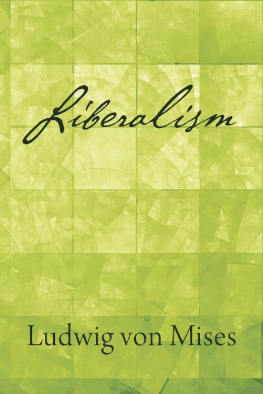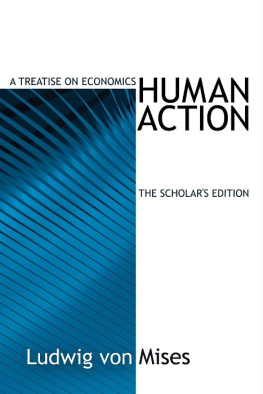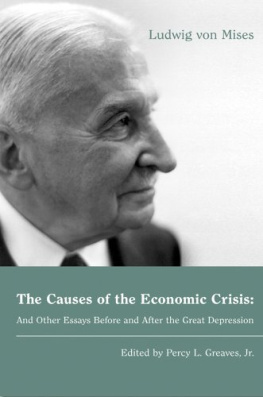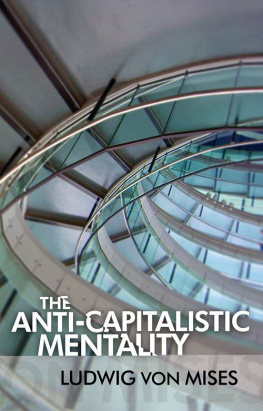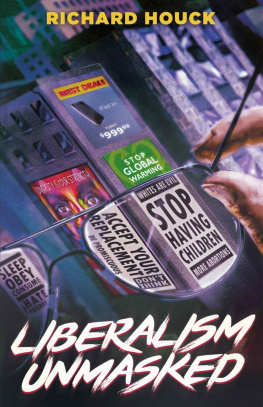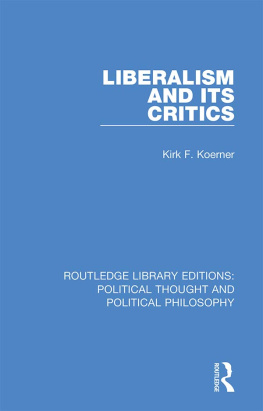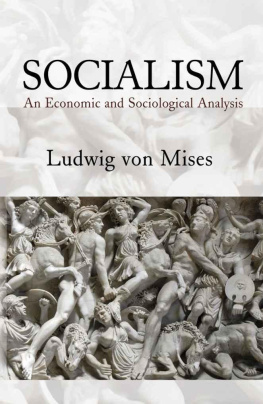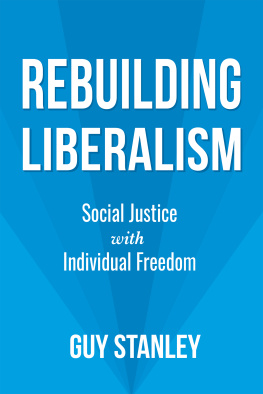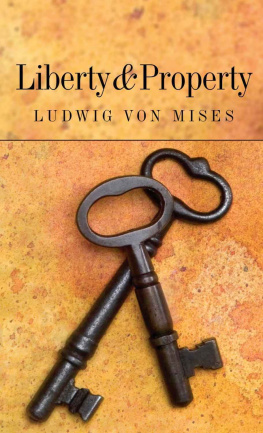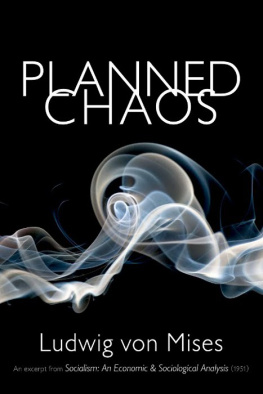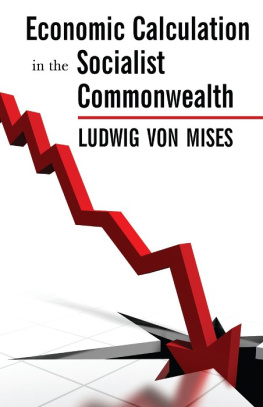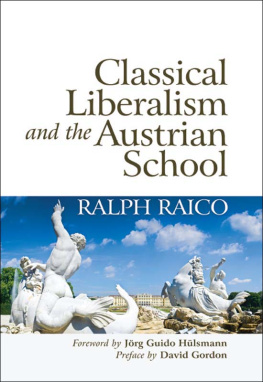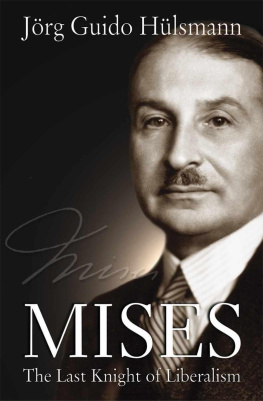Liberalism
By Ludwig von Mises
Translated by Ralph Raico
Edited by Arthur Goddard
Mises Institute , founded in 1982, is a teaching and research center for the study of Austrian economics, libertarian and classical liberal political theory, and peaceful international relations. In support of the school of thought represented by Ludwig von Mises, Murray N. Rothbard, Henry Hazlitt, and F.A. Hayek, we publish books and journals, sponsor student and professional conferences, and provide online education. Mises.org is a vast resource of free material for anyone in the world interested in these ideas. For we seek a radical shift in the intellectual climate, away from statism and toward a private property order.
For more information, see , or phone us at 1.800.OF.MISES.
Mises Institute
518 West Magnolia Avenue
Auburn, Alabama 36832
English translation by Ralph Raico
Printing history:
Originally published in German under the title Liberalismus in 1927 by Gustav Fischer
The Free and Prosperous Commonwealth: An Exposition of the Ideas of Classical Liberalism in 1962 by D. Van Nostrand
Liberalism: A Socio-Economic Exposition in 1978 by Sheed Andrews and McMeel
Liberalism: In The Classical Tradition in 1985 by the Foundation for Economic Education
Reprinted in 2010 by the Ludwig von Mises Institute Published under Creative Commons Attribution 3.0. http://creativecommons.org/licenses/by/3.0/
ISBN: 978-1-933550-84-8
eISBN: 978-1-610164-08-5
Foreword
Any political philosophy must address itself to a central question: under what conditions is the initiation of violence to be considered legitimate? One philosophy may endorse such violence on behalf of the interests of a majority racial group, as with the National Socialists of Germany. Another may endorse it on behalf of a particular economic class, as with the Bolsheviks of Soviet Russia. Still another may prefer to avoid a doctrinaire position one way or another, leaving it to the good judgment of those who administer the state to decide when the common good demands the initiation of violence and when it does not. This is the stance of the social democracies.
The liberal sets a very high threshold for the initiation of violence. Beyond the minimal taxation necessary to maintain legal and defense servicesand some liberals shrink even from this he denies to the state the power to initiate violence and seeks only peaceful remedies to perceived social ills. He opposes violence for the sake of redistributing wealth, of enriching influential pressure groups, or trying to improve mans moral condition. Civilized people, says the liberal, interact with each other not according to the law of the jungle, but by means of reason and discussion. Man is not to be made good by means of the prison guard and the hangman; should they be necessary to make him good, his moral condition is already beyond salvage. As Ludwig von Mises puts it in this seminal book, modern man must free himself from the habit, just as soon as something does not please him, of calling for the police.
There has been something of a renaissance in Misesian studies in the wake of the financial crisis that first gripped the world in 2007 and 2008, since it was followers of Mises who had the most compelling explanations for economic phenomena that left most so-called experts stammering. The importance of Misess economic contributions to modern-day discussion is apt to make us overlook his contributions as a social theorist and political philosopher. The republication of Liberalism helps to rectify this oversight.
The liberalism that Mises describes here is, of course, not the liberalism of the United States today, but rather classical liberalism, which is how the term continues to be understood in Europe. Classical liberalism stands for individual liberty, private property, free trade, and peace, fundamental principles from which the rest of the liberal program can be deduced. (When the first English edition of Liberalism appeared in 1962, Mises published it under the title The Free and Prosperous Commonwealth , in order not to confuse American readers who associated liberalism with a creed very different from the one he championed.)
It is no insult to Mises to describe his defense of liberalism as parsimonious, in the sense that, following Occams Razor, he employs on its behalf no concepts not strictly necessary to his argument. Thus Mises makes no reference to natural rights, a concept that plays a central role in so many other expositions of liberalism. He focuses primarily on the necessity of large-scale social cooperation. This social cooperation, by which complex chains of production function to improve the general standard of living, can be brought about only by an economic system based on private property. Private property in the means of production, coupled with the progressive extension of the division of labor, has helped to free mankind from the horrific afflictions that once confronted the human race: disease, grinding poverty, appalling rates of infant mortality, general squalor and filth, and radical economic insecurity, with people often living one bad harvest away from starvation. Until the market economy illustrated the wealth-creating possibilities of the division of labor, it was taken for granted that these grotesque features of mans condition were the fixed dictates of a cold and merciless nature, and thus unlikely to be substantially alleviated, much less conquered entirely, by human effort.
Students have been taught for many generations to think of property as a dirty word, the very embodiment of avarice. Mises will have none of it. If history could prove anything in regard to this question, it could only be that nowhere and at no time has there ever been a people which has raised itself without private property above a condition of the most oppressive penury and savagery scarcely distinguishable from animal existence. Social cooperation, Mises shows, is impossible in the absence of private property, and any attempts to curtail the right of property undermine the central pillar of modern civilization.
Indeed Mises firmly anchors liberalism to private property. He is all too aware that to champion property is to invite the accusation that liberalism is merely a veiled apologia for capital. The enemies of liberalism have branded it as the party of the special interests of the capitalists, Mises observes. This is characteristic of their mentality. They simply cannot understand a political ideology as anything but the advocacy of certain special privileges opposed to the general welfare. Mises shows in this book and throughout his corpus of work that the system of private ownership of the means of production redounds to the benefit not merely of the direct owners of capital but indeed to all of society.
There is, in fact, no particular reason that people in possession of great wealth should favor the liberal system of free competition, in which continuous effort must be exerted on behalf of the desires of the consumers if that wealth is not to be whittled away. Those who possess great wealthespecially those who inherited that wealthmay in fact prefer to inhabit a system of intervention, which is more likely to keep existing patterns of wealth frozen. Little wonder that American business magazines during the Progressive Era are replete with calls for replacing laissez-faire, a system in which no ones profits are protected, with government-sanctioned cartel and collusion devices.
Naturally, given Misess emphasis on the centrality of the division of labor to the maintenance and progress of civilization, he is particularly outspoken regarding the evils of aggressive war, which on top of its physical and human toll brings about the progressive impoverishment of mankind by its radical disruption of a harmonious structure of production that spans the entire globe. Mises, who rarely minces words but whose prose is generally elegant and restrained, speaks with indignation and outrage when the subject turns to European imperialism, a cause on whose behalf he will admit no arguments whatever. Just as his student, Murray Rothbard, would later identify war and peace as the foundational issue of the whole liberal program,


